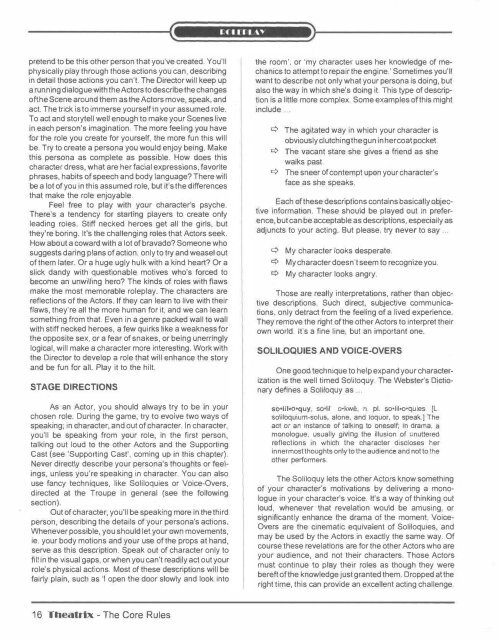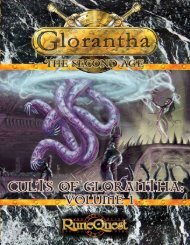Untitled - Index of - Free
Untitled - Index of - Free
Untitled - Index of - Free
You also want an ePaper? Increase the reach of your titles
YUMPU automatically turns print PDFs into web optimized ePapers that Google loves.
pretend to be this other person that you've created. You'll<br />
physically play through those actions you can, describing<br />
in detail those actions you can't. The Director will keep up<br />
a running dialogue with the Actors to describe the changes<br />
<strong>of</strong>the Scene around them as the Actors move, speak, and<br />
act. The trick is to immerse yourself in your assumed role.<br />
To act and storytell well enough to make your Scenes live<br />
in each person's imagination The more feeling you have<br />
for the role you create for yourself, the more fun this will<br />
be. Try to create a persona you would enjoy being. Make<br />
this persona as complete as possible. How does this<br />
character dress, what are her facial expressions, favorite<br />
phrases, habits <strong>of</strong> speech and body language? There will<br />
be a lot <strong>of</strong> you in this assumed role, but it's the differences<br />
that make the role enjoyable.<br />
Feel free to play with your character's psyche.<br />
There's a tendency for starting players to create only<br />
leading roles. Stiff necked heroes get all the girls, but<br />
they're boring. It's the challenging roles that Actors seek.<br />
How about a coward with a lot <strong>of</strong> bravado? Someone who<br />
suggests daring plans <strong>of</strong> action, only to try and weasel out<br />
<strong>of</strong> them later. Or a huge ugly hulk with a kind heart? Or a<br />
slick dandy with questionable motives who's forced to<br />
become an unwilling hero? The kinds <strong>of</strong> roles with flaws<br />
make the most memorable roleplay. The characters are<br />
reflections <strong>of</strong> the Actors. If they can learn to live with their<br />
flaws, they're all the more human for it, and we can learn<br />
something from that. Even in a genre packed wall to wall<br />
with stiff necked heroes, a few quirks like a weakness for<br />
the opposite sex, or a fear <strong>of</strong> snakes, or being unerringly<br />
logical, will make a character more interesting. Work with<br />
the Director to develop a role that will enhance the story<br />
and be fun for all. Play it to the hilt.<br />
STAGE DIRECTIONS<br />
As an Actor, you should always try to be in your<br />
chosen role. During the game, try to evolve two ways <strong>of</strong><br />
speaking; in character, and out <strong>of</strong> character. In character,<br />
you'll be speaking from your role, in the first person,<br />
talking out loud to the other Actors and the Supporting<br />
Cast (see 'Supporting Cast', coming up in this chapter).<br />
Never directly describe your persona's thoughts or feel<br />
ings, unless you're speaking in character. You can also<br />
use fancy techniques, like Soliloquies or Voice-Overs,<br />
directed at the Troupe in general (see the following<br />
section).<br />
Out <strong>of</strong> character, you'll be speaking more in the third<br />
person, describing the details <strong>of</strong> your persona's actions.<br />
Whenever possible, you should let your own movements,<br />
ie. your body motions and your use <strong>of</strong> the props at hand,<br />
serve as this description. Speak out <strong>of</strong> character only to<br />
fill in the visual gaps, or when you can't readily act out your<br />
role's physical actions. Most <strong>of</strong> these descriptions will be<br />
fairly plain, such as 'I open the door slowly and look into<br />
16 Theatrlx- The Core Rules<br />
the room', or 'my character uses her knowledge <strong>of</strong> me<br />
chanics to attempt to repair the engine.' Sometimes you'll<br />
want to describe not only what your persona is doing, but<br />
also the way in which she's doing it. This type <strong>of</strong> descrip<br />
tion is a little more complex. Some examples <strong>of</strong> this might<br />
include ...<br />
¢ The agitated way in which your character is<br />
obviously clutching the gun in her coat pocket.<br />
¢ The vacant stare she gives a friend as she<br />
walks past.<br />
¢ The sneer <strong>of</strong> contempt upon your character's<br />
face as she speaks.<br />
Each <strong>of</strong> these descriptions contains basically objec<br />
tive information. These should be played out in prefer<br />
ence, but can be acceptable as descriptions, especially as<br />
adjuncts to your acting. But please, try never to say ...<br />
¢ My character looks desperate.<br />
¢ My character doesn't seem to recognize you.<br />
¢ My character looks angry.<br />
Those are really interpretations, rather than objec<br />
tive descriptions. Such direct, subjective communica<br />
tions, only detract from the feeling <strong>of</strong> a lived experience.<br />
They remove the right <strong>of</strong> the other Actors to interpret their<br />
own world. It's a fine line, but an important one.<br />
SOLILOQUIES AND VOICE-OVERS<br />
One good technique to help expand your character<br />
ization is the well timed Soliloquy. The Webster's Dictio<br />
nary defines a Soliloquy as ...<br />
so•lil•o•quy, so•lil' o•kwe, n. pl. so•lil•o•quies. [L.<br />
soliloquium-solus, alone, and loquor, to speak.) The<br />
act or an instance <strong>of</strong> talking to oneself; in drama, a<br />
monologue, usually giving the illusion <strong>of</strong> unuttered<br />
reflections 1n which the character discloses her<br />
innermost thoughts only to the audience and not to the<br />
other performers.<br />
The Soliloquy lets the other Actors know something<br />
<strong>of</strong> your character's motivations by delivering a mono<br />
logue in your character's voice. It's a way <strong>of</strong> thinking out<br />
loud, whenever that revelation would be amusing, or<br />
significantly enhance the drama <strong>of</strong> the moment. Voice<br />
Overs are the cinematic equivalent <strong>of</strong> Soliloquies, and<br />
may be used by the Actors in exactly the same way. Of<br />
course these revelations are for the other Actors who are<br />
your audience, and not their characters. Those Actors<br />
must continue to play their roles as though they were<br />
bereft <strong>of</strong> the knowledge just granted them. Dropped at the<br />
right time, this can provide an excellent acting challenge.



